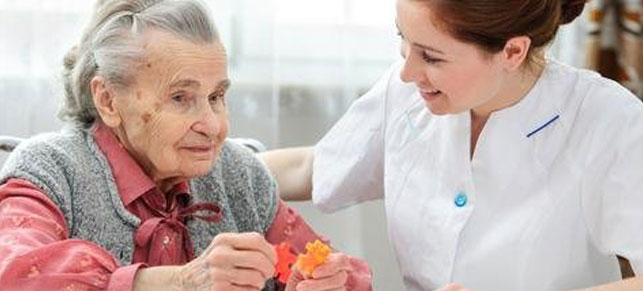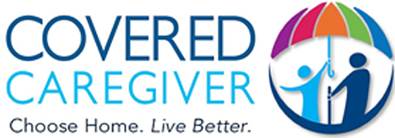 15 Jul 2015
15 Jul 2015
Caring & Helping Your Loved One With Alzheimer’s
When Alzheimer’s begins to set during the early stages, functioning independently most often is not problematic. However, when the condition progresses, even simple tasks can become challenging and frustrating. So, as this stage begins to unfold, offering practical solutions can give an impression to your loved one that their dignity and freedom remains intact, though they are beginning to depend on others for even simple daily tasks. As seamless as you wish this to be, never forget that each individual’s needs might vary, but that the volume of challenges for anyone with Alzheimer’s remains the same.
Reduce the Possibility of Frustrations:
With Alzheimer’s, completing even the simplest daily tasks can be challenging and naturally, frustration will begin to creep in. Make it easier for your loved one by reducing their challenges. For example, scheduling wisely for doctor visits or grocery runs and other errands and making things predictable like when meals are to be eaten or TV shows to be watched, can minimize confusion for them.
Be Flexible:
With the progression of Alzheimer’s, things begin to change for your loved one. Even activities that were once done quickly, might take more time now. So plan more time for every task, so you don’t get frustrated being time bound. Get your loved one involved by letting them do whatever they can so it reduces their hassle. Of course, you would love to help them and also make things go faster, but it could be unconstructive and affect them negatively. Some things to remember are: Don’t give them a lot of choices, make your instructions simpler and reduce distractions when they are doing something.
Be aware that they might be moody and be adamant about things like wearing the same clothing every day, or not wanting to bathe every day. In such scenarios, come up with solutions like swapping a clean set of identical dresses when they’re taking a shower or swapping bathing for a towel bath every other day.
Reduce Risks:
With Alzheimer’s, their ability to reason, solve problems or even acting swiftly deteriorates. So, to keep your loved one safe from injury, you should keep your home an injury-free zone. You could do this by removing unwanted rugs, clutter and other unorganized material and add grab bars or handrails wherever needed. You can use locks for cabinets with hazardous items such as guns, alcohol, and cleaning products.
Keep lighters, matches and other hazardous objects out of reach and if it is a must for them to use anything hazardous, keep a close eye on them. For any unforeseen circumstances, have a fire extinguisher and other emergency items handy. Remember, these are just general guidelines for caring, though tweaking should be done according to the individual’s needs and requirements. Having said that, Alzheimer’s does take a toll on their health and behavior and aside from the mental aspect of Alzheimer’s disease, physical changes to their body will happen. It is important to remain patient, flexible, get help when needed and understand that challenges and frustrations will arise.
BY: Ohad J, Pearl, MPH
Alzheimer’s
COMMENTS: No Comments
 02 Jul 2015
02 Jul 2015
Alzheimer’s & Family Conflict – How to Deal with It
Alzheimer’s disease tends to trigger stress in families, especially after a loved one is diagnosed with it. However, like any family conflict, this tribulation calls for working together and dealing with it upfront and openly. Of course, it could be devastating to find out about a loved one enduring this dreaded condition – you could feel sadness, fear, anger or even frustration. This surge of emotions and the constant stress of conflict can become a regular affair, all while family members are trying to adapt to this new situation. As one unit, this is the best option to tackling Alzheimer’s and addressing its burden.
Divide the Responsibilities:
Every member of the family can bring a different set of resources or capabilities. For example, a sister might be good at taking care of the ailing member, while someone like a nephew might be good with offering errands or chores. Even more, a relative with strong finances might provide the ability to fund care financially. In the end, it is important to understand what each member of the family can provide to not only minimize the burden from their loved one, but also create a livable situation for all.
Meet Up:
Meeting up regularly with the family member affected by Alzheimer’s and close relatives, including their caregivers is very important. Upon meeting, it is important to discuss the responsibilities of every member, challenges experienced thus far and any changes, if needed. Throughout the discussion, everyone should be transparent and be ready for changes that were probably not even considered. When there are difficulties meeting face-to-face (due to lack of time, or distance to travel, etc.), video conferencing or phone calls should be the immediate next solution. In addition, to maintain good communication and sharing of information emails and social media accounts can be a great benefit. However, if there are challenges aside from the immediate care of your loved one, such as personality conflicts between siblings or other family members, it would be wise to seek professional help – a geriatric care manager or counselor.
Stay Truthful:
Of course, tension builds up when a loved one is diagnosed with a health condition and a surge of uncontrollable emotions over them doesn’t help. Instead, talking openly about your emotions and the situation itself can help. Sharing that this burden feels overwhelming is a positive step in allowing everyone else to be transparent. Try to avoid any blame during this time because no one other than the disease itself brought on Alzheimer’s to the family member. Even during these early meetings, when emotions run high and everyone is searching for answers, it is important to remain calm and comprehend that the family is in this together and simply looking to adapt to this situation. Always talk about yourself and give a keen ear and remain open-minded during discussions. Also, never criticize any member’s support or care, because everyone has different ways of expressing their love and care. Being judgmental can break that fragile balance.
Find Professional Help:
Get professional help when needed. Alzheimer’s can take a large toll on everyone involved and if you think it is tearing everyone apart and breaking family ties, seeking professional help or going for family counseling is a good idea. Working out issues and conflicts will help you move forward and give more time to care for your loved one, when they need it the most.
BY: Ohad J, Pearl, MPH
Alzheimer’s
COMMENTS: No Comments
 15 Jun 2015
15 Jun 2015
Alzheimer’s Medical Checkup – 4 Fundamental Tips
Are you taking care of a loved one with Alzheimer’s diseases? If yes, then you must know that sometimes it gets too strenuous and that you need to know everything clearly in order do even the everyday, mundane tasks. One of the main ways to properly take care of your loved one is to make the most out of your doctor’s appointment.
Knowledge never hurts when it comes to taking care of an Alzheimer’s patient and you need to clarify each and everything that you can with the doctor. So here is a guide comprising of seven tips on how to make the most out of regular medical checkups and how to take better care of your loved one.
Schedule Your Appointments at a Convenient Time:
It is important that you schedule your appointments at a convenient time when there is not much noise at the clinic nor do you have to wait for too long. Make sure your loved one doesn’t have to sit and do nothing for too long or they will get bored and agitated. Bring along food, drinks and something for entertainment if you are going to have to wait for a period of time.
Be Ready To Ask Each and Every Question:
Don’t hold back when it comes to asking questions! While taking care of an Alzheimer’s patient, the more you know will allow for a better experience. Ask the doctor questions about your loved one’s temperament or their medication. You need to make sure that your loved gets the right type and amount of medication. Furthermore, you can bring the containers of the current medicine with you and discuss your loved one’s responses, whether favorable or not.
Stick To the Important Questions:
There are many important questions you need to ask your doctor, make sure you ask them all. For example, ask the doctor about your loved one’s memory, temperament and overall health. If you have lately sensed something different with the way your loved one has been behaving or if you have noticed any change in their daily habits then be sure to ask the doctor. Ask the doctor about how they are going to be over time and discuss about the idea of caregiving or getting help from local support groups.
Take Notes or Record The Conversation:
The most important thing is that you don’t forget anything you have learned from the doctor’s visit. Bring along a notebook and a pen to take notes of the conversation or if you need to handle your loved one, bring along another person who can take all the notes of the doctor’s conversation so that you can access this information at a later time. If the doctor allows you to, then use the recording feature of your phone to record the entire session.
BY: Ohad J, Pearl, MPH
Alzheimer’s
COMMENTS: No Comments
 07 Feb 2015
07 Feb 2015
Who’s Alzheimer’s? Who’s Alzheimer’s? Who’s Alzheimer’s?
By the time you’ve read this paragraph, a late-stage Alzheimer’s patient may have forgotten it. With sadly no cure in sight, what we know about Alzheimer’s are the symptoms its patients suffer from– for those dealing with it, that’s where it begins – and unfortunately at this very moment – that’s where it ends.
Perhaps, facing this hurdle will require us to get a little more intimate with the disease. After all, it affects all of us. According to the shattering statistics reported by the Alzheimer’s Association, 5 million Americans live with the disease, and 1 out of 3 seniors die from the disease or another form of dementia. Furthermore, it is the most expensive condition in the nation.
These numbers actually mean something more significant as they begin to translate into our parents, grandparents, friends and neighbors who are suffering or have suffered from it. The dramatic changes not only affect that person but also forever alter their family.
For now, learning to live with the condition, or guide our family members to live with it, is the only achievable goal. Whether we want to face it or not, this condition is a part of many of our lives. Although working towards a cure would be our ultimate triumph, medically we find ourselves being able to offer not much more today than in 1901 when Alzheimer’s was first observed.
So… who’s Alzheimer?
The account begins with a German-trained physician named Alois Alzheimer who had a passion for psychiatry and neuropathology. Exploring how to combine his research and clinical practice, Alzheimer established his own brain research laboratory at the Munich medical school where he published many papers on conditions and diseases of the brain. This milestone in Alzheimer’s career led to a 1906 lecture, which made him famous in the science and research community and, ultimately, his name has been linked to millions of people evermore.
Alzheimer speaks of his most famous patient, August D., who suffered from symptoms of memory loss, disorientation, hallucinations leading up to and her eventual death at 55. Post-mortem, Alzheimer studied August’s brain and identified an “unusual disease of the cerebral cortex” where never previously described before, nerve “tangles” were observed. His colleague Emil Kraepelin, the founder of modern scientific psychiatry, named those who exhibit these characteristic changes after Alzheimer.
Over 100 years after these findings by Alois Alzheimer, patients suffering from this disease and their families are saddened to hear that there is not much to offer in the ways of cure, or even treatment. That being said, the symptoms are treatable at least through one effective way: caregiving.
Seniors today have more options with senior home care services for Alzheimer’s and dementia than ever before. With nursing homes and assisted living facilities specialized to take on these particular patients, gaining acceptance of the disease as a nation, as a family and as an individual will play a role in how we plan and bring accomplishment to the remaining chapter of our lives; and help not define it as a dreary end.
While we focus on acceptance of Alzheimer’s into our every day lives, there is no denying the economic forecast for these institutions within the senior home care industry. Remember, there is no cure for Alzheimer’s or dementia; and facilities that specialize in this degenerative disease do not or cannot offer a cure.
Consider a similarly effective option of individual, healthcare-credentialed caregivers such as Certified Nursing Assistants (CNAs) or Home Health Aides (HHAs) taking care of patients in their own homes. This promising preference allows seniors and their families to get the help they need to preserve their lives while remaining and aging comfortably at home. Through experienced and trained caregivers, patients have their symptoms managed and prioritized, are provided personal attention and are exposed to 2-3 times less the cost of nursing homes or assisted living facilities.
The first step in accepting Alzheimer’s in our day-to-day is recognizing that good caregiving is the best treatment we can offer; that symptom management, keeping safe in one’s daily routine, and avoiding complications of dementia are the best we can offer at this time. The second step is determining where that caregiving will occur: specialty institutions or home. If you ask most seniors- they choose home. As John Ed Pearce said, “Home is a place you grow up wanting to leave, and grow old wanting to get back to.”
BY: Ohad J, Pearl, MPH
Alzheimer’s
COMMENTS: No Comments
